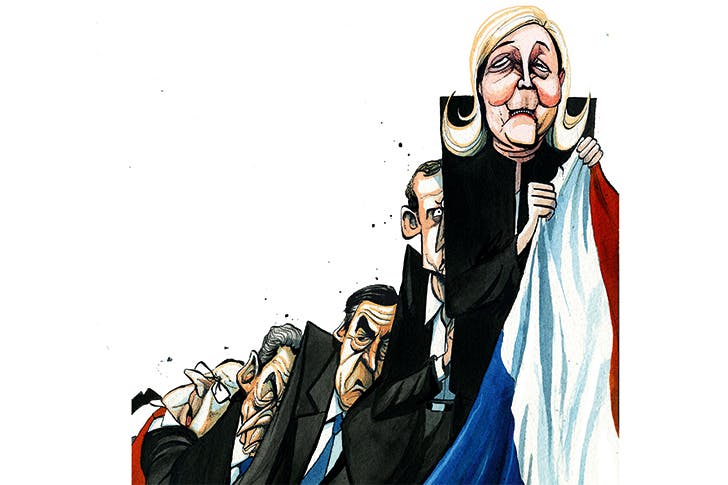With less than twenty four hours before polling booths open in France, the country’s security forces are on full alert for another attack by Islamist extremists. More than 50,000 police and 7,000 soldiers have been mobilised as part of the massive security operation but they still lack the resources to safeguard every polling station. In Paris, for example, only 400 of the 896 polling booths will have security personnel on duty.
But it’s not just Islamists who are menacing France. The far left has called for a ‘Night of Barricades’ [a reference to the May demonstrations of 1968] to begin on Sunday at 6pm, to oppose what they describe as this ‘masquerade of an election…between liberalism on the one side and fascism on the other’.
By fascism, they mean the National Front, although so far in this election campaign it has been the far-left who has played the part of the fascists. There have been repeated attempts to intimidate and attack their political opponents, notably an ambush in February of two coach-loads of National Front supporters en route to a rally in Nantes. Having surrounded the vehicles, around 100 hooded far-left supporters began smashing them with iron bars and wooden stakes.
François Fillon, the conservative candidate, subsequently accused the Socialist government of not doing enough to safeguard candidates and their supporters. Declaring that ‘every day, a handful of far-left demonstrators come to disrupt my meetings’, he warned that there was ‘a climate of quasi-civil war’ spreading throughout the country.
The government rejected the charge but the attacks on the right have continued. Fillon was flour-bombed earlier in the month as he arrived at a rally, and there have been several violent demonstrations at National Front meetings. The most recent was on Easter Sunday, when scores of hooded protestors gathered outside the venue in northern Paris before Marine Le Pen’s address to her supporters. Brandishing placards bearing slogans such as ‘Everybody hates the FN’ and ‘All the cops are fascists’, the demonstrators hurled projectiles at the police, who responded with tear gas.
It could well be a foretaste of things to come if Marine Le Pen advances to the second round of the election. When her father, Jean-Marie, did something similar in 2002 it sparked widespread demonstrations throughout France. For the most part they were vocal but well-ordered. There was the odd clash in Paris, and in Rouen, where four youths were detained for throwing stones, but on the whole the left’s reaction to Le Pen’s victory was one of dignified dismay.
Many fear that won’t be the case if his daughter wins on Sunday. The far-left in France, as across much of the West, has become more aggressive and more oppressive in the last fifteen years. The anti-fascists have become the fascists of the 21st century, seeking to shut down alternative views to their own either through physical violence or verbal intimidation.
Throughout France last summer there was widespread violence by far-left groups protesting at the government’s attempts to introduce a small amount of flexibility into the French workplace; the worst scenes occurred in Paris where a mob attacked a children’s hospital.
It’s no coincidence that Islamic extremism has flourished in France in the last decade. There are elements of the far-left who have aligned themselves with the religious fundamentalists, united by a hatred of the police and of capitalism. When demonstrators took to the streets of Paris last month to protest against the alleged rape of a young black man by a policeman, Algerian flags were waved alongside Anti-Fascist ones.
In May last year Patrick Calvar, the head of the DGSI, the French intelligence agency responsible for counter-terrorism, warned a parliamentary enquiry that the country ‘was on the brink of a civil war’. The catalyst, he predicted, would be if the miscellaneous hardline factions within the far-right united and confronted the far-left. The last time the two clashed was in 2013, when a group of skinheads encountered members of an anti-fascist organisation in a Paris shop; in the resultant brawl one of the anti-fascists was killed. Although a police investigation found that the left-wing group instigated the fight, the government used the incident as an excuse to ban three far-right organisations.
Consequently the far-left has grown in confidence, and violence, while the far-right has turned instead to the ballot box. Should they vote Marine Le Pen into the second round of the election, the reaction of their extreme political opponents could be explosive. In an interview with Le Figaro on Friday, Thibault de Montbrial, a lawyer specialising in terrorism, warned: ‘The intelligence services are in fact very worried at the scale of the violence which various splinter groups of the far left are calling for on Sunday night’.








Comments